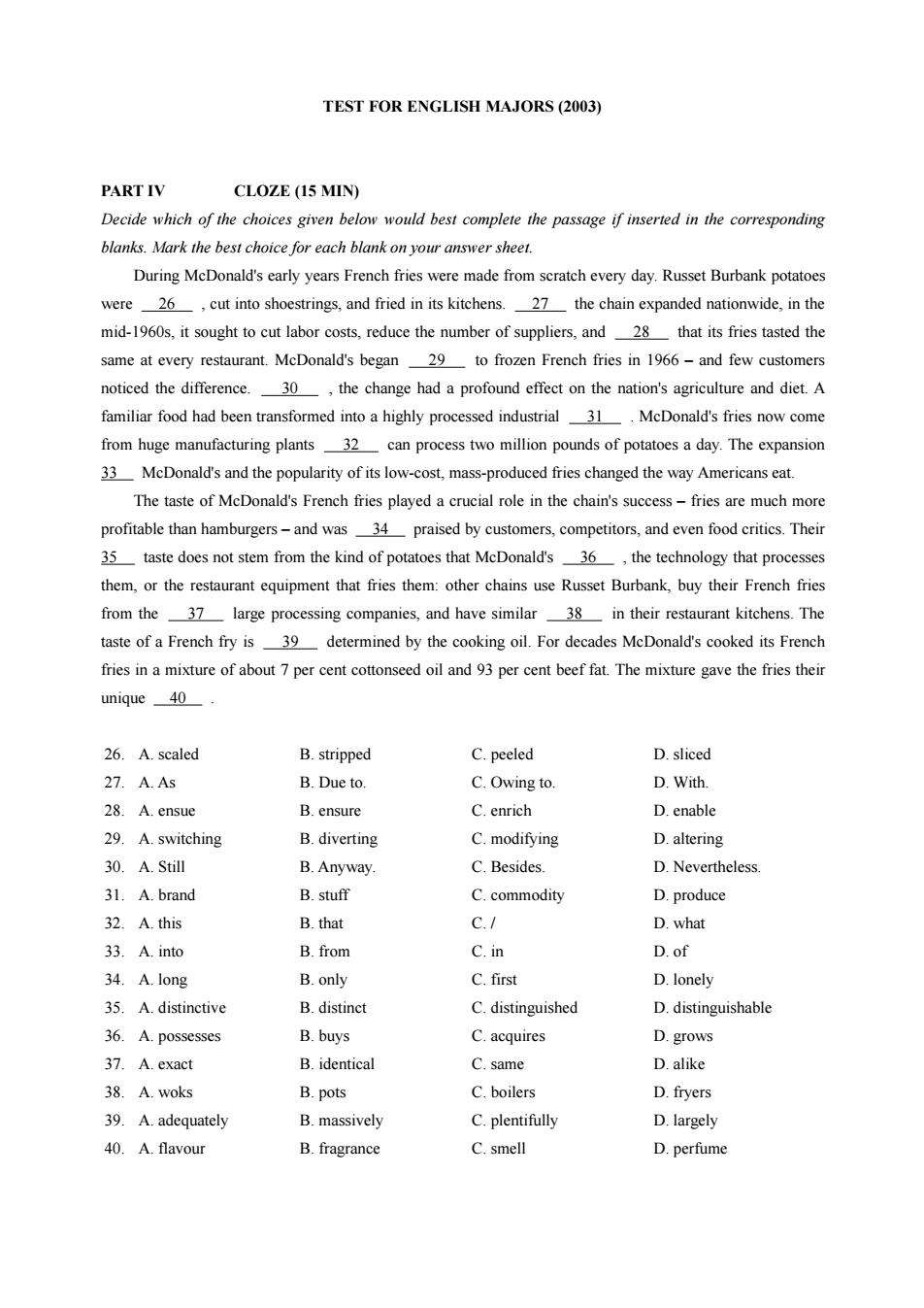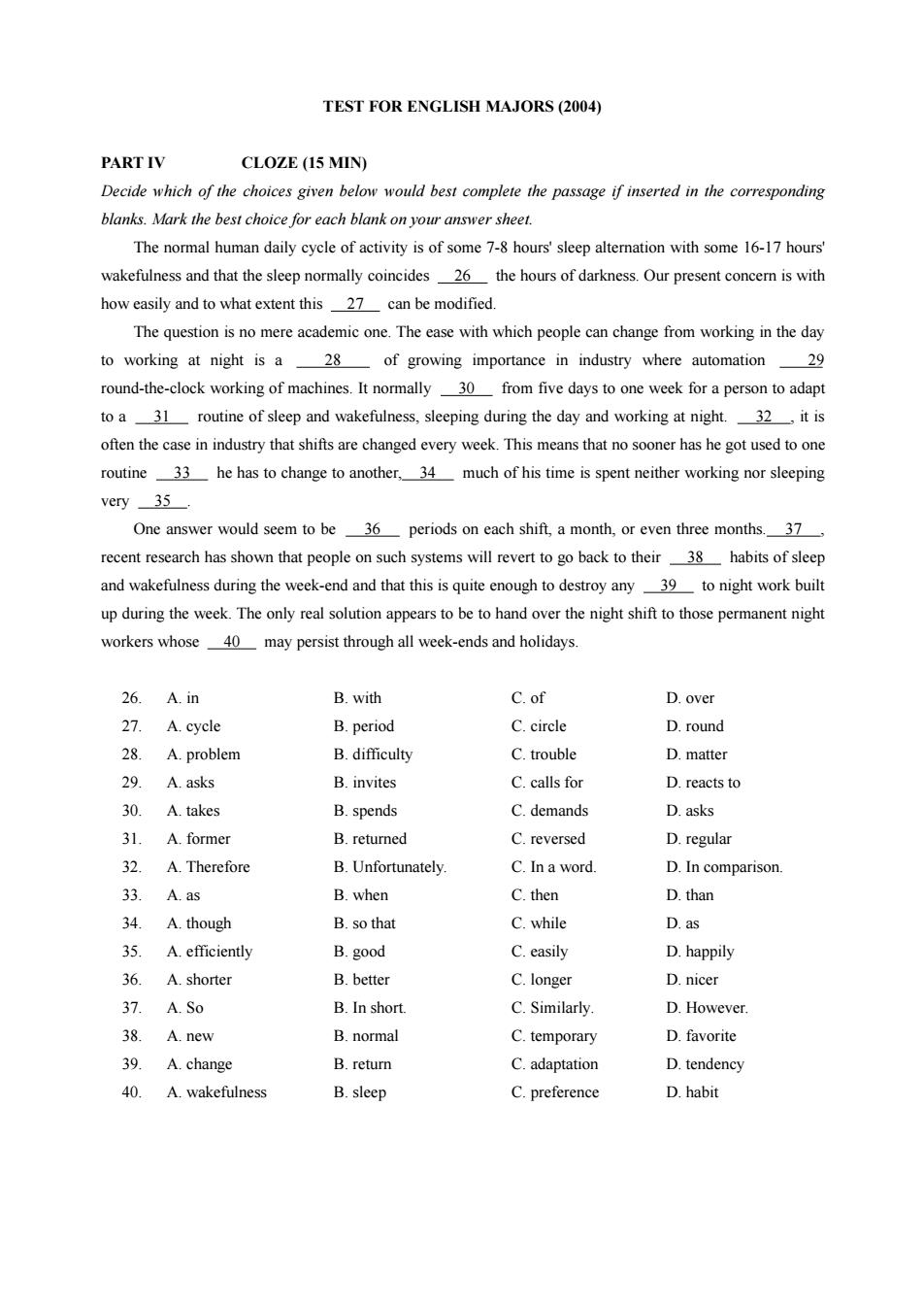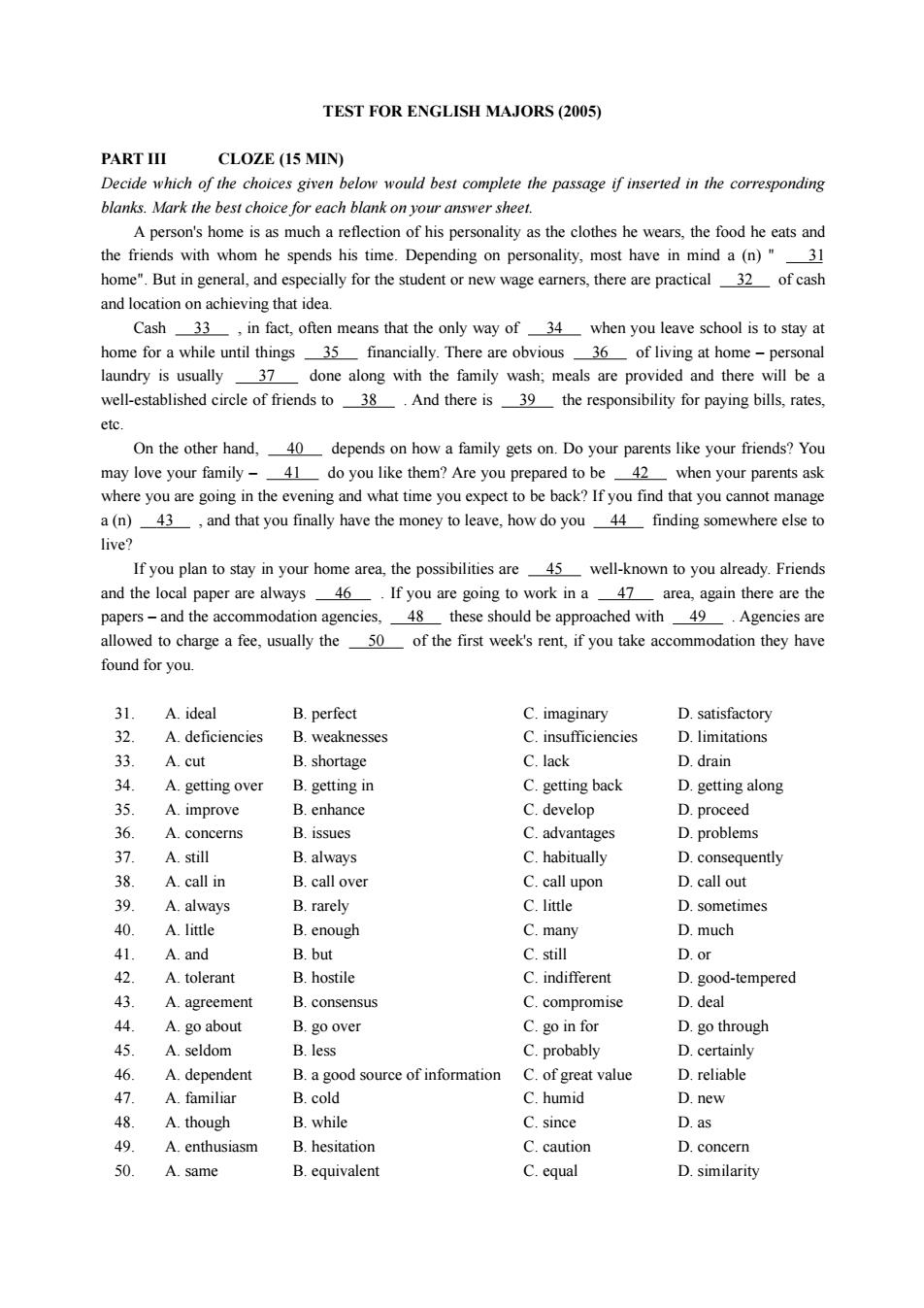
TEST FOR ENGLISH MAJORS(2003) PART IV CLOZE (15 MIN) Decide which of the choices given below would best complete the passage if inserted in the corresponding blanks.Mark the best choice for each blank on your answer sheet. During McDonald's early years French fries were made from scratch every day.Russet Burbank potatoes were26,cut into shoestrings,and fried in its kitchens.27 the chain expanded nationwide,in the mid-1960s,it sought to cut labor costs,reduce the number of suppliers,and 28 that its fries tasted the same at every restaurant.McDonald's began 29 to frozen French fries in 1966-and few customers noticed the difference.30,the change had a profound effect on the nation's agriculture and diet.A familiar food had been transformed into a highly processed industrial 31.McDonald's fries now come from huge manufacturing plants 32 can process two million pounds of potatoes a day.The expansion 33McDonald's and the popularity of its low-cost,mass-produced fries changed the way Americans eat. The taste of McDonald's French fries played a crucial role in the chain's success-fries are much more profitable than hamburgers-and was 34 praised by customers,competitors,and even food critics.Their 35 taste does not stem from the kind of potatoes that McDonald's 36,the technology that processes them,or the restaurant equipment that fries them:other chains use Russet Burbank,buy their French fries from the37 large processing companies,and have similar 38 in their restaurant kitchens.The taste of a French fry is 39 determined by the cooking oil.For decades McDonald's cooked its French fries in a mixture of about 7 per cent cottonseed oil and 93 per cent beef fat.The mixture gave the fries their unique 40. 26.A.scaled B.stripped C.peeled D.sliced 27.A.As B.Due to. C.Owing to. D.With. 28.A.ensue B.ensure C.enrich D.enable 29.A.switching B.diverting C.modifying D.altering 30.A.Still B.Anyway. C.Besides. D.Nevertheless 31.A.brand B.stuff C.commodity D.produce 32.A.this B.that C.1 D.what 33.A.into B.from C.in D.of 34.A.long B.only C.first D.lonely 35.A.distinctive B.distinct C.distinguished D.distinguishable 36.A.possesses B.buys C.acquires D.grows 37.A.exact B.identical C.same D.alike 38.A.woks B.pots C.boilers D.fryers 39.A.adequately B.massively C.plentifully D.largely 40.A.flavour B.fragrance C.smell D.perfume
TEST FOR ENGLISH MAJORS (2003) PART IV CLOZE (15 MIN) Decide which of the choices given below would best complete the passage if inserted in the corresponding blanks. Mark the best choice for each blank on your answer sheet. During McDonald's early years French fries were made from scratch every day. Russet Burbank potatoes were 26 , cut into shoestrings, and fried in its kitchens. 27 the chain expanded nationwide, in the mid-1960s, it sought to cut labor costs, reduce the number of suppliers, and 28 that its fries tasted the same at every restaurant. McDonald's began 29 to frozen French fries in 1966 – and few customers noticed the difference. 30 , the change had a profound effect on the nation's agriculture and diet. A familiar food had been transformed into a highly processed industrial 31 . McDonald's fries now come from huge manufacturing plants 32 can process two million pounds of potatoes a day. The expansion 33 McDonald's and the popularity of its low-cost, mass-produced fries changed the way Americans eat. The taste of McDonald's French fries played a crucial role in the chain's success – fries are much more profitable than hamburgers – and was 34 praised by customers, competitors, and even food critics. Their 35 taste does not stem from the kind of potatoes that McDonald's 36 , the technology that processes them, or the restaurant equipment that fries them: other chains use Russet Burbank, buy their French fries from the 37 large processing companies, and have similar 38 in their restaurant kitchens. The taste of a French fry is 39 determined by the cooking oil. For decades McDonald's cooked its French fries in a mixture of about 7 per cent cottonseed oil and 93 per cent beef fat. The mixture gave the fries their unique 40 . 26. A. scaled B. stripped C. peeled D. sliced 27. A. As B. Due to. C. Owing to. D. With. 28. A. ensue B. ensure C. enrich D. enable 29. A. switching B. diverting C. modifying D. altering 30. A. Still B. Anyway. C. Besides. D. Nevertheless. 31. A. brand B. stuff C. commodity D. produce 32. A. this B. that C. / D. what 33. A. into B. from C. in D. of 34. A. long B. only C. first D. lonely 35. A. distinctive B. distinct C. distinguished D. distinguishable 36. A. possesses B. buys C. acquires D. grows 37. A. exact B. identical C. same D. alike 38. A. woks B. pots C. boilers D. fryers 39. A. adequately B. massively C. plentifully D. largely 40. A. flavour B. fragrance C. smell D. perfume

TEST FOR ENGLISH MAJORS(2004) PART IV CLOZE (15 MIN) Decide which of the choices given below would best complete the passage if inserted in the corresponding blanks.Mark the best choice for each blank on your answer sheet. The normal human daily cycle of activity is of some 7-8 hours'sleep alternation with some 16-17 hours' wakefulness and that the sleep normally coincides 26 the hours of darkness.Our present concern is with how easily and to what extent this 27 can be modified. The question is no mere academic one.The ease with which people can change from working in the day to working at night is a28of growing importance in industry where automation 29 round-the-clock working of machines.It normally 30 from five days to one week for a person to adapt to a 31 routine of sleep and wakefulness,sleeping during the day and working at night.32,it is often the case in industry that shifts are changed every week.This means that no sooner has he got used to one routine 33 he has to change to another,34 much of his time is spent neither working nor sleeping very 35 One answer would seem to be36 periods on each shift,a month,or even three months.37, recent research has shown that people on such systems will revert to go back to their38 habits of sleep and wakefulness during the week-end and that this is quite enough to destroy any 39 to night work built up during the week.The only real solution appears to be to hand over the night shift to those permanent night workers whose 40 may persist through all week-ends and holidays. 26. A.in B.with C.of D.over 27. A.cycle B.period C.circle D.round 28. A.problem B.difficulty C.trouble D.matter 29. A.asks B.invites C.calls for D.reacts to 30. A.takes B.spends C.demands D.asks 31 A.former B.returned C.reversed D.regular 32. A.Therefore B.Unfortunately. C.In a word. D.In comparison. 33. A.as B.when C.then D.than 34. A.though B.so that C.while D.as 35. A.efficiently B.good C.easily D.happily 36. A.shorter B.better C.longer D.nicer 37. A.So B.In short. C.Similarly. D.However. 38 A.new B.normal C.temporary D.favorite 39 A.change B.return C.adaptation D.tendency 40. A.wakefulness B.sleep C.preference D.habit
TEST FOR ENGLISH MAJORS (2004) PART IV CLOZE (15 MIN) Decide which of the choices given below would best complete the passage if inserted in the corresponding blanks. Mark the best choice for each blank on your answer sheet. The normal human daily cycle of activity is of some 7-8 hours' sleep alternation with some 16-17 hours' wakefulness and that the sleep normally coincides 26 the hours of darkness. Our present concern is with how easily and to what extent this 27 can be modified. The question is no mere academic one. The ease with which people can change from working in the day to working at night is a 28 of growing importance in industry where automation 29 round-the-clock working of machines. It normally 30 from five days to one week for a person to adapt to a 31 routine of sleep and wakefulness, sleeping during the day and working at night. 32 , it is often the case in industry that shifts are changed every week. This means that no sooner has he got used to one routine 33 he has to change to another, 34 much of his time is spent neither working nor sleeping very 35 . One answer would seem to be 36 periods on each shift, a month, or even three months. 37 , recent research has shown that people on such systems will revert to go back to their 38 habits of sleep and wakefulness during the week-end and that this is quite enough to destroy any 39 to night work built up during the week. The only real solution appears to be to hand over the night shift to those permanent night workers whose 40 may persist through all week-ends and holidays. 26. A. in B. with C. of D. over 27. A. cycle B. period C. circle D. round 28. A. problem B. difficulty C. trouble D. matter 29. A. asks B. invites C. calls for D. reacts to 30. A. takes B. spends C. demands D. asks 31. A. former B. returned C. reversed D. regular 32. A. Therefore B. Unfortunately. C. In a word. D. In comparison. 33. A. as B. when C. then D. than 34. A. though B. so that C. while D. as 35. A. efficiently B. good C. easily D. happily 36. A. shorter B. better C. longer D. nicer 37. A. So B. In short. C. Similarly. D. However. 38. A. new B. normal C. temporary D. favorite 39. A. change B. return C. adaptation D. tendency 40. A. wakefulness B. sleep C. preference D. habit

TEST FOR ENGLISH MAJORS (2005) PART III CLOZE (15 MIN) Decide which of the choices given below would best complete the passage if inserted in the corresponding blanks.Mark the best choice for each blank on your answer sheet. A person's home is as much a reflection of his personality as the clothes he wears,the food he eats and the friends with whom he spends his time.Depending on personality,most have in mind a(n)"31 home".But in general,and especially for the student or new wage earners,there are practical32 of cash and location on achieving that idea. Cash33,in fact,often means that the only way of 34 when you leave school is to stay at home for a while until things 35 financially.There are obvious 36 of living at home-personal laundry is usually 37 done along with the family wash;meals are provided and there will be a well-established circle of friends to 38.And there is 39 the responsibility for paying bills,rates, etc. On the other hand,40depends on how a family gets on.Do your parents like your friends?You may love your family-41 do you like them?Are you prepared to be 42 when your parents ask where you are going in the evening and what time you expect to be back?If you find that you cannot manage a(n)43,and that you finally have the money to leave,how do you 44 finding somewhere else to live? If you plan to stay in your home area,the possibilities are 45 well-known to you already.Friends and the local paper are always 46.If you are going to work in a 47 area,again there are the papers-and the accommodation agencies,48 these should be approached with 49.Agencies are allowed to charge a fee,usually the 50 of the first week's rent,if you take accommodation they have found for you. 31. A.ideal B.perfect C.imaginary D.satisfactory 32 A.deficiencies B.weaknesses C.insufficiencies D.limitations 33 A.cut B.shortage C.lack D.drain 34. A.getting over B.getting in C.getting back D.getting along 35. A.improve B.enhance C.develop D.proceed 36. A.concerns B.issues C.advantages D.problems 37 A.still B.always C.habitually D.consequently 38 A.call in B.call over C.call upon D.call out 39 A.always B.rarely C.little D.sometimes 40. A.little B.enough C.many D.much 41. A.and B.but C.still D.or 42 A.tolerant B.hostile C.indifferent D.good-tempered 43. A.agreement B.consensus C.compromise D.deal 44. A.go about B.go over C.go in for D.go through 45. A.seldom B.less C.probably D.certainly 46 A.dependent B.a good source of information C.of great value D.reliable 47. A.familiar B.cold C.humid D.new 48 A.though B.while C.since D.as 49 A.enthusiasm B.hesitation C.caution D.concern 50. A.same B.equivalent C.equal D.similarity
TEST FOR ENGLISH MAJORS (2005) PART III CLOZE (15 MIN) Decide which of the choices given below would best complete the passage if inserted in the corresponding blanks. Mark the best choice for each blank on your answer sheet. A person's home is as much a reflection of his personality as the clothes he wears, the food he eats and the friends with whom he spends his time. Depending on personality, most have in mind a (n) " 31 home". But in general, and especially for the student or new wage earners, there are practical 32 of cash and location on achieving that idea. Cash 33 , in fact, often means that the only way of 34 when you leave school is to stay at home for a while until things 35 financially. There are obvious 36 of living at home – personal laundry is usually 37 done along with the family wash; meals are provided and there will be a well-established circle of friends to 38 . And there is 39 the responsibility for paying bills, rates, etc. On the other hand, 40 depends on how a family gets on. Do your parents like your friends? You may love your family – 41 do you like them? Are you prepared to be 42 when your parents ask where you are going in the evening and what time you expect to be back? If you find that you cannot manage a (n) 43 , and that you finally have the money to leave, how do you 44 finding somewhere else to live? If you plan to stay in your home area, the possibilities are 45 well-known to you already. Friends and the local paper are always 46 . If you are going to work in a 47 area, again there are the papers – and the accommodation agencies, 48 these should be approached with 49 . Agencies are allowed to charge a fee, usually the 50 of the first week's rent, if you take accommodation they have found for you. 31. A. ideal B. perfect C. imaginary D. satisfactory 32. A. deficiencies B. weaknesses C. insufficiencies D. limitations 33. A. cut B. shortage C. lack D. drain 34. A. getting over B. getting in C. getting back D. getting along 35. A. improve B. enhance C. develop D. proceed 36. A. concerns B. issues C. advantages D. problems 37. A. still B. always C. habitually D. consequently 38. A. call in B. call over C. call upon D. call out 39. A. always B. rarely C. little D. sometimes 40. A. little B. enough C. many D. much 41. A. and B. but C. still D. or 42. A. tolerant B. hostile C. indifferent D. good-tempered 43. A. agreement B. consensus C. compromise D. deal 44. A. go about B. go over C. go in for D. go through 45. A. seldom B. less C. probably D. certainly 46. A. dependent B. a good source of information C. of great value D. reliable 47. A. familiar B. cold C. humid D. new 48. A. though B. while C. since D. as 49. A. enthusiasm B. hesitation C. caution D. concern 50. A. same B. equivalent C. equal D. similarity